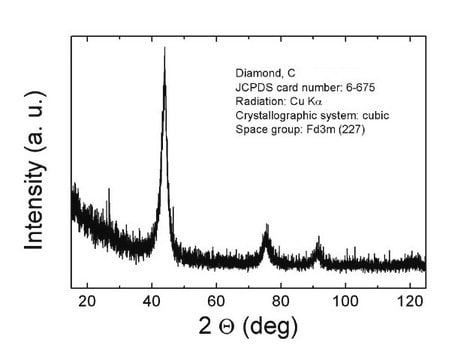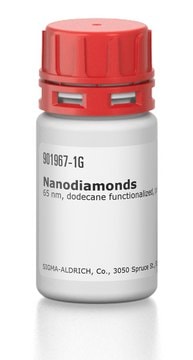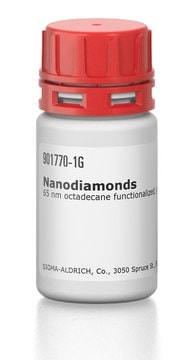483591
Diamond
synthetic monocrystalline powder, ≤1 μm
Sign Into View Organizational & Contract Pricing
All Photos(1)
About This Item
Empirical Formula (Hill Notation):
C
CAS Number:
Molecular Weight:
12.01
EC Number:
MDL number:
UNSPSC Code:
12352103
NACRES:
NA.23
Recommended Products
form
synthetic monocrystalline powder
particle size
≤1 μm
density
3.5 g/mL at 25 °C (lit.)
application(s)
battery manufacturing
Looking for similar products? Visit Product Comparison Guide
Related Categories
Application
Monocrystalline diamond particles internalized in human endothelial cells have potential applications in drug delivery.
Storage Class
11 - Combustible Solids
wgk_germany
nwg
flash_point_f
Not applicable
flash_point_c
Not applicable
ppe
Eyeshields, Gloves, type N95 (US)
Certificates of Analysis (COA)
Search for Certificates of Analysis (COA) by entering the products Lot/Batch Number. Lot and Batch Numbers can be found on a product’s label following the words ‘Lot’ or ‘Batch’.
Already Own This Product?
Find documentation for the products that you have recently purchased in the Document Library.
Micron-sized diamond particles are internalized by endothelial cells.
Walkowiak B, et al.
Diamond and Related Materials, 18, 651-656 (2009)
Magnetic field imaging and more.
Daniel Evanko
Nature methods, 10(6), 468-468 (2013-07-20)
Diamond planets.
John Matson
Scientific American, 308(1), 12-12 (2013-01-25)
Reusable biochemical diagnosis systems based on nanodiamonds.
V S Bondar et al.
Doklady. Biochemistry and biophysics, 448, 55-58 (2013-03-13)
Alexandre Barras et al.
Nanoscale, 5(6), 2307-2316 (2013-02-12)
Bacterial attachment and subsequent biofilm formation on biotic surfaces or medical devices is an increasing source of infections in clinical settings. A large proportion of these biofilm-related infections are caused by Escherichia coli, a major nosocomial pathogen, in which the
Our team of scientists has experience in all areas of research including Life Science, Material Science, Chemical Synthesis, Chromatography, Analytical and many others.
Contact Technical Service







